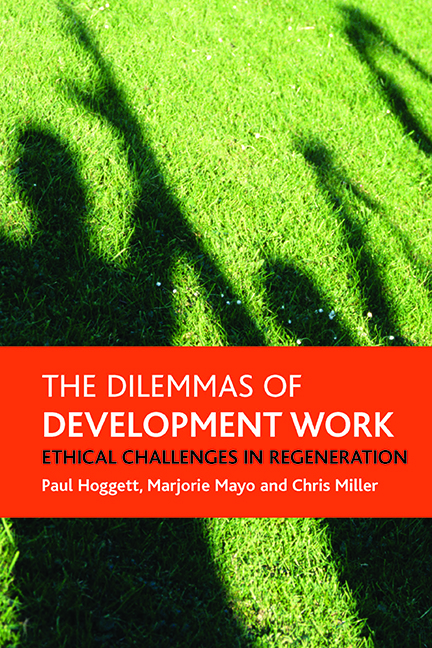nine - Doing the work: negotiating the modernisation agenda
Published online by Cambridge University Press: 21 January 2022
Summary
The modernisation of community
As previous chapters have already argued, modernisation agendas define spatial and other communities both as part of the problems of exclusion and community cohesion in contemporary Britain and as part of their solution. Communities are defined as constituting social problems, when neighbourhoods become characterised as sites for ‘out of control’ young people, for cycles of deprivation and for conflictual community relations. And conversely, neighbourhoods are being defined as vehicles for public sector reform, invited to step into the democratic deficit that has been associated with the emasculation of local government and the destruction of the social fabric that so often accompanies rapid economic change. Thus, it has been suggested, communities become the harbingers of devolved community governance and the new ‘localism’, espoused by political parties across the political spectrum. As Chapter Two has already suggested, these differing definitions, approaches and agendas have impacted in powerful ways, posing ethical issues and dilemmas for front-line professionals working to promote participation in governance, active citizenship and empowerment among service users and among young people, particularly those living within disadvantaged neighbourhoods, identified as being in need of some form of professional intervention.
There are powerful parallels with decentralisation strategies pursued in development contexts in the South. As Greig, Hulme and Turner have demonstrated, ‘One of the most popular initiatives for reducing democratic deficits has been decentralization involving the delegation of decision-making authority from central government to political bodies in provinces, municipalities, communes and other subnational territories’ (Greig et al, 2007, p 229). Dubbed the latest fashion in development administration from the 1980s, this approach gained momentum from the 1990s, in the wake of the collapse of the former Soviet Union and the end of a number of military dictatorships in the global South. Decentralisation strategies were typically accompanied by the promotion of community participation, with enhanced roles for NGOs, including international NGOs (INGOs), as well as more local community-based organisations (CBOs). Here too, then, the democratic deficit was to be addressed. And state intervention was to be rolled back, with NGOs/INGOs providing legitimacy, representing the acceptable face of increasing marketisation (Hulme and Edwards, 1997; Mayo, 2005). Community participation has been described as a new orthodoxy, the ‘new tyranny’ even in the context of the neoliberal development paradigm (Cooke and Kothari, 2001; Hickey and Mohan, 2004).
- Type
- Chapter
- Information
- The Dilemmas of Development WorkEthical Challenges in Regeneration, pp. 145 - 164Publisher: Bristol University PressPrint publication year: 2008

